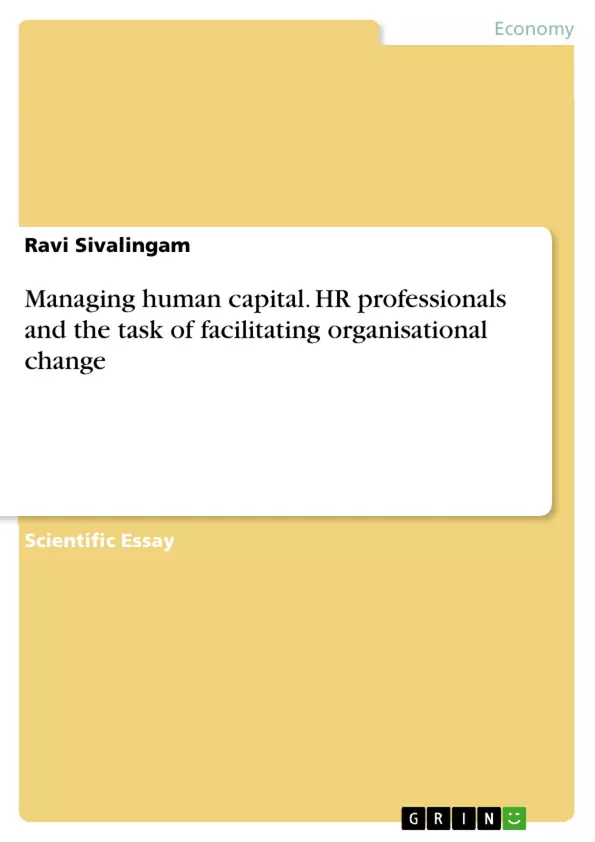Using a qualitative research approach anchored on secondary data, the objective of this paper is to assess the various roles of HR professionals that are unique to every organisation according to the demands of the organisations that are usually based upon the business objectives of the firm.
HR professionals are placed with the task of facilitating the changes that are necessary for achieving organisational change that are vital to the success of the firm. This paper will scrutinize various literature related to HR Roles and provide indisputable facts that reveal the true nature of the functional sphere of the HR professional who often have a misconstrued perception of their true role.
This casual research paper will primarily examine multitude secondary data that provide insight into the role of the HR professional coupled with empirical evidence based on observations and surveys conducted by previous researchers over the last three decades on how organisations have relied on HRD as a champion of change that requires them to draw attention to the needs of the organisation and formulate practical and applicable methods towards meeting these changes with the least amount of resistance.
The subsequent review of literature that will be presented will start with a review of Collins and the emphasis placed on HR management concepts and approaches that are developed based on organisational structures which are in turn bounded to cultural elements and how these are streamlined with business objectives which further contribute to the complexity of the entire organisational framework. The review of literature will also contain examples of organisations that owe success not only to their products, but also the innovative HR approach that enabled these companies to attract and retain the best of talents within their industry that gave them the competitive advantage over their rivals
Inhaltsverzeichnis (Table of Contents)
- Abstract
- Introduction
- Review of Literature
- HR as Change Agent
- HR as a Strategic Partner
- The role of the Human Resource Department
- HRM in the International Organisation
- HRD and Flexible High Performance Organisations
- Facilitator of Organiser
- HR as an Outsourced Facility
- Conclusion
Zielsetzung und Themenschwerpunkte (Objectives and Key Themes)
This paper aims to explore the evolving roles of Human Resource professionals in organizations, particularly in light of globalization and economic liberalization. The paper will analyze how HR has become a crucial element in managing organizational change and achieving business objectives.
- The impact of globalization and economic liberalization on organizational structures and HR functions
- The evolving roles of HR professionals in managing change, fostering organizational success, and leveraging human capital
- The strategic importance of HR in achieving organizational goals and building a competitive advantage
- The challenges and opportunities facing HR departments in the context of dynamic business environments
- The shift in focus from traditional HR functions to strategic partnerships and organizational development
Zusammenfassung der Kapitel (Chapter Summaries)
The paper begins by outlining the significant impact of globalization and economic liberalization on organizations and the critical role HR plays in facilitating necessary adaptations. The "Review of Literature" delves into various perspectives on HR, including its role as a change agent, strategic partner, and facilitator of organizational change. This section explores the functions and responsibilities of HR departments in international organizations and flexible high-performance organizations, highlighting the strategic importance of HR in achieving business goals.
The paper also analyzes the complex relationship between HR and organizational culture, emphasizing the need for HR practices to be aligned with business objectives. Examples of successful organizations that have utilized innovative HR approaches to attract and retain talent are provided, showcasing the potential of HR to drive organizational success. The paper concludes with an examination of HR as an outsourced facility, further exploring the evolving landscape of HR practices in the modern business environment.
Schlüsselwörter (Keywords)
The key terms and concepts covered in this paper include: Human Resource Development, Organizational Change Management, Globalization, Economic Liberalization, Strategic HR, HR as Change Agent, HR as a Strategic Partner, Talent Management, Organizational Culture, International Organizations, Flexible High Performance Organizations, Outsourcing, Human Capital.
Frequently Asked Questions
What is the role of HR as a "Change Agent"?
HR professionals facilitate necessary organizational changes to adapt to globalization and meet business objectives with minimal resistance.
How does globalization affect HR management?
It demands more flexible, high-performance structures and requires HR to act as a strategic partner rather than just a support function.
Can HR outsourcing be effective for organizational change?
The paper examines HR as an outsourced facility and how this impacts the ability to manage internal change and culture.
What is the link between HR and organizational culture?
HR management concepts must be aligned with cultural elements to successfully streamline business objectives and attract top talent.
Why is human capital considered vital for a firm's success?
Innovative HR approaches allow companies to attract and retain the best talent, providing a significant competitive advantage.
- Quote paper
- Ravi Sivalingam (Author), 2016, Managing human capital. HR professionals and the task of facilitating organisational change, Munich, GRIN Verlag, https://www.grin.com/document/414648



